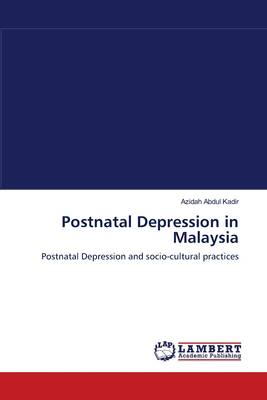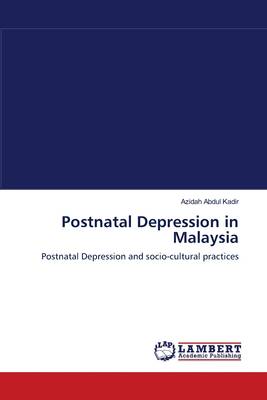
- Afhalen na 1 uur in een winkel met voorraad
- Gratis thuislevering in België vanaf € 30
- Ruim aanbod met 7 miljoen producten
- Afhalen na 1 uur in een winkel met voorraad
- Gratis thuislevering in België vanaf € 30
- Ruim aanbod met 7 miljoen producten
Zoeken
Postnatal Depression in Malaysia
Postnatal Depression and socio-cultural practices
Azidah Abdul Kadir
Paperback | Engels
€ 71,45
+ 142 punten
Omschrijving
The mood disorders which affect newly delivered women range from a relatively short but emotionally labile time, popularly called the "blues", to a serious psychiatric disorder requiring specialized treatment. Recent studies show that 10 - 15 % of women suffered from Postnatal Depression. Mood disorders following childbirth are not confined to Western societies, and have been recognized worldwide and throughout history. In Malaysia and Asia at large, pregnant and confined mothers are always accorded important roles and demand significant attention from families and society. In Malaysia, motherhood marks a transitional period in the women's life, and provision is made for her to be treated differently, usually for a period of about six weeks. It is postulated that these ritual and cultural practices have protective effect against developing Postnatal Depression. This book is the first interdisciplinary reader focusing on the burden of depression in pregnancy and puerperium (in particular postnatal depression) and study the influence of socio-cultural practices with Postnatal Depression in Malaysia.
Specificaties
Betrokkenen
- Auteur(s):
- Uitgeverij:
Inhoud
- Aantal bladzijden:
- 116
- Taal:
- Engels
Eigenschappen
- Productcode (EAN):
- 9783838314624
- Verschijningsdatum:
- 21/05/2010
- Uitvoering:
- Paperback
- Afmetingen:
- 152 mm x 220 mm
- Gewicht:
- 181 g

Alleen bij Standaard Boekhandel
+ 142 punten op je klantenkaart van Standaard Boekhandel
Beoordelingen
We publiceren alleen reviews die voldoen aan de voorwaarden voor reviews. Bekijk onze voorwaarden voor reviews.








